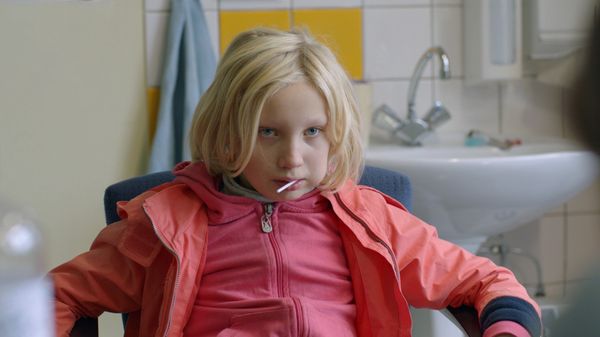Eye For Film >> Movies >> System Crasher (2019) Film Review
System Crasher
Reviewed by: Jennie Kermode

If you've already heard of System Crasher, it's probably because of 11-year-old Helena Zengel, who won Best Actress at Palm Springs this year and attracted quite a bit of awards notice elsewhere for her role as the disturbed pre-teen at the heart of Nora Fingscheidt's film. Everything that has been said about her is true. She's an extraordinary talent whose performance will keep you glued to the screen throughout, her character Benni sometimes frightening, sometimes tragic, always wild.
Can a child that age be frightening? Yes, when she's battering the head of another child off the nearest hard surface. Benni has a serious lack of inhibitions. She 'flips out', as she describes it, and for all that she knows it's a problem, she can't seem to make it stop. It's a problem for her, as well as for others, because it means that her mother Bianca (Lisa Hagmeister) can't cope with her, and so she's denied the one thing that she wants more than anything else - that consistent source of love. By the time we meet her she has been expelled from multiple group homes and spent numerous unhappy nights strapped to a bed in a psychiatric ward. Moving around from one place to another is clearly making her worse and her case worker Mrs Bafané (Gabriela Maria Schmeide) is now struggling to find anywhere that will take her on. But just when the situation seems hopeless, along comes Micha (Albrecht Schuch), a man used to dealing with aggressive teenage boys, with a plan that might just work.

On the one hand, System Crasher is a fierce critique of a system that routinely fails children with problems of this sort (a critique that can be applied far beyond Germany). On the other, it's a character study, inviting the audience to get inside the head of the sort of troubled kid that they might usually shun. Making her white, female, small and blond might make this easier, but Zengel goes out of her way to alienate everyone around her with violence, vivid language and vicious threats. At the same time, it's impossible not to see that she's a child in desperate need, seizing hold of anything that looks like it might turn into love. Her bursts of affection have an intense appeal like winning the trust of a wild animal. This, too, is a dangerous power, and both Micha and Mrs Bafané both find themselves at risk of becoming professionally compromised by it.
This isn't an easy watch but it's a compelling one. Whilst Benni's pain is raw and acutely distressing to witness - even when triggered by things which, to an adult, would seem trivial - the bursts of joy that she experiences when things are going her way are exhilarating. This energy is important to keeping viewers focused through a necessarily meandering story with a lot of false starts. Without overplaying the ugliness of life in the system or at any point invoking malice (apart from a disturbing incident in Benni's early childhood), the film demonstrates how damaging it can be, yet it also illustrates the absence of simple solutions and the risks involved in getting close to children whose need can easily become overwhelming.
As intelligent as it is emotive, this tightly focused, personal story has a lot to say about a complex subject, and never takes the easy route. It's a film that will stay in your head for a long time after the credits have rolled.
Reviewed on: 26 Mar 2020
















